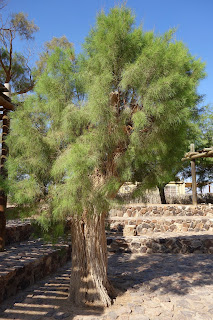This month at Pasture Living, I'm sharing what I learned during my Israel trip and why I think this series is very relevant to healthy living. I believe being physically healthy is important, but being mentally, psychologically, and spiritually healthy is also extremely important for a fulfilling and joyful life. If you missed any of this series, click here.
Advent Day 3
 |
| Tamarisk tree in the desert |
 |
| Leaves of tamarisk tree is moist as they retain water |
We had a chance to hike in the Beersheba desert, following the footsteps of our father Abraham. Learning not only with our eyes, but also with our feet allows us to experience and embrace the truth in a much deeper level. This was where Abraham lived (Gen 22:19), where he made a covenant with Abimelech (Gen 21:31), where the Lord appeared to Hagar (Gen 21:9-21), and where Abraham planted a tamarisk tree and called on the name of the Lord, the eternal God (Gen 21:33). (If you know the story of Abraham, God told Abraham to leave his country, his people, and his father’s household (which means he'd lose his rights, protection, and inheritance) and go to a land he's never been to. He could have just refused, questioned, and said no, but he didn't. He listened, trusted, and obeyed God, even though he didn't know what lied in front of him. That is why he is called the "father of faith." A tamarisk tree is a very slow-growing tree. It takes many years to grow and Abraham knew. He didn't plant this tree in the desert for his own benefits but for the benefits of the generations to come. He knew the people in the desert would need it. The desert is hot and shelter is scarce. Tamarisk trees retain and secrete moisture which serve as natural air conditioning for the people. This is the great thing about our father Abraham. He was not only obedient, gentle, and protective of his people (remember how he fought a great length to save Lot), he was also a selfless person who thought about other people. What is our tamarisk tree? Do we "plant" something just for our own benefits or do we want to plant something that will benefit other people?
I often wonder why do I have to forgo the tasty fast food, MSG, sweets, and all the processed snacks that lure us wherever we go. And then take the time to find healthy food, researching about them, teaching my family, explaining to others why we do things differently, and hoping that my children will understand that living healthily is more than just about eating healthy, but it's because it is pleasing to God when we take care of our bodies well. Like Abraham and my late-grandfather, I want to leave a legacy worth remembering after my time is up on earth and that the world will know the God we live for.
I often wonder why do I have to forgo the tasty fast food, MSG, sweets, and all the processed snacks that lure us wherever we go. And then take the time to find healthy food, researching about them, teaching my family, explaining to others why we do things differently, and hoping that my children will understand that living healthily is more than just about eating healthy, but it's because it is pleasing to God when we take care of our bodies well. Like Abraham and my late-grandfather, I want to leave a legacy worth remembering after my time is up on earth and that the world will know the God we live for.
No comments:
Post a Comment